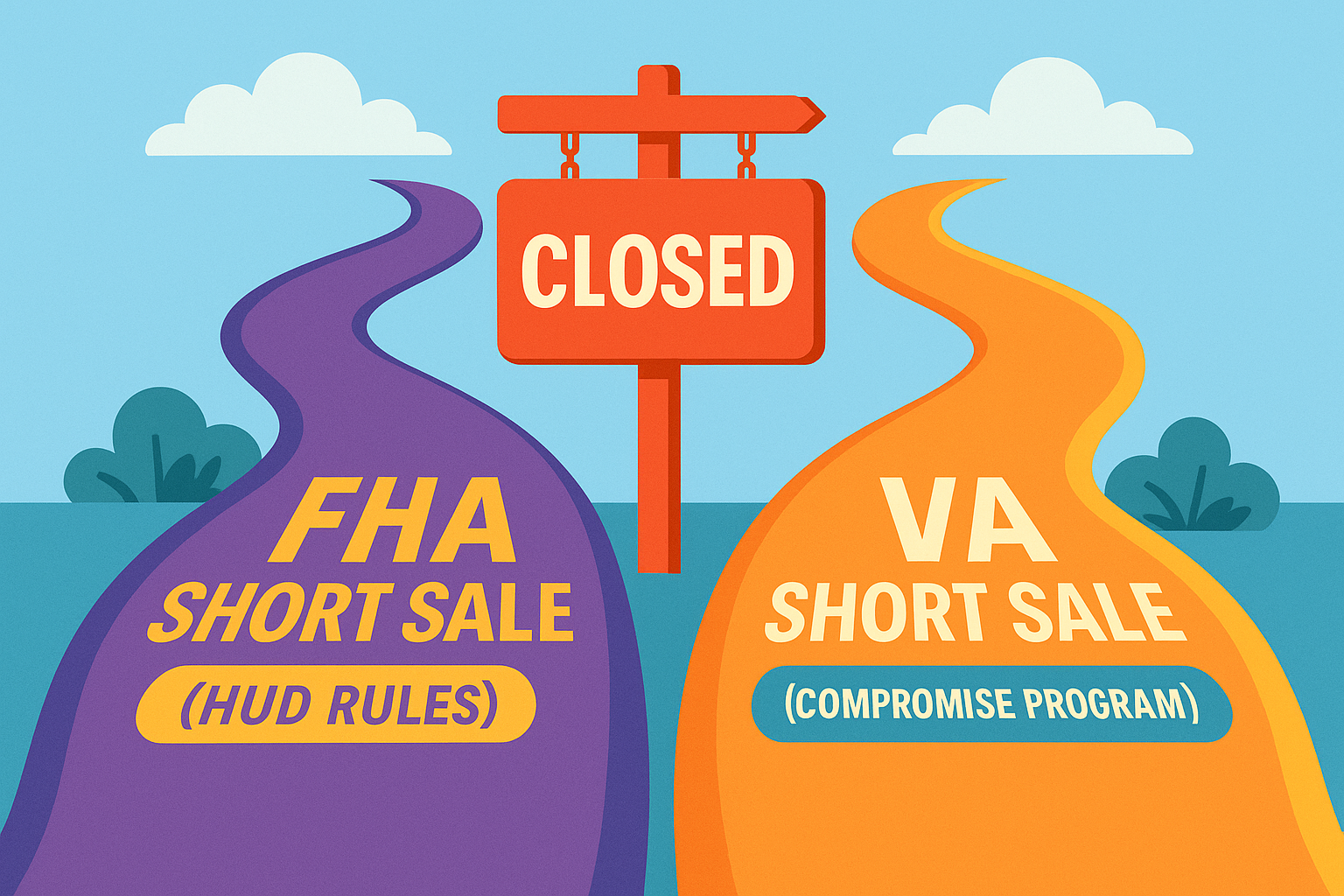Inside the FHA & VA Short Sale Playbook: Timelines, Forms, and Traps to Avoid
For most agents, short sales already feel like an obstacle course. But when that loan is FHA or VA-backed, the game changes completely. You’re not just dealing with a lender anymore — you’re working within a federally regulated process that has its own rulebook, timelines, and forms. And if you miss a single step, your deal can grind to a halt before it ever reaches the closing table.
At Crisp Short Sales, we’ve handled hundreds of FHA and VA short sales nationwide. Here’s what every agent and homeowner should know before diving into one of these deals — and how to make the process smooth, fast, and predictable.
1. FHA Short Sales: The Pre-Foreclosure Sale Program
The FHA short sale process operates under HUD’s Pre-Foreclosure Sale (PFS) Program — a structured system that dictates nearly everything, from how the property is priced to when it can close.
Before a seller can even list the property, the servicer must determine eligibility and issue an Approval to Participate (ATP). Without that ATP letter, the sale can’t move forward.
Key differences from conventional short sales:
- The property must be owner-occupied (or recently vacated for hardship reasons).
- HUD requires its own independent as-is appraisal to establish value — not the lender’s opinion.
- There’s usually a 15- to 30-day marketing window before HUD will even review an offer.
- The net-to-HUD requirement is strict; there’s no negotiating below the minimum allowed.
If the offer doesn’t meet HUD’s formula, the servicer’s hands are tied. That’s where experienced short sale processors come in — we know how to dispute valuations, document condition issues, and get the right value accepted before the file stalls.
Learn more about how we handle these challenges on our short sale negotiation page.
2. VA Short Sales: The Compromise Sale Program
VA loans run under an entirely different system called the Compromise Sale Program, overseen by the Department of Veterans Affairs. The VA is generally more flexible about timelines but just as strict about documentation.
Here’s how it works:
- The servicer submits the offer to VA for final review — yes, VA must sign off before approval.
- The VA requires its own Net Value analysis based on an internal appraisal.
- The seller must show a clear financial hardship, and the file often requires verification of all assets and income.
- The VA may pay off certain title or lien costs to facilitate closing, which can actually make these short sales easier to close than conventional ones.
Still, delays can occur when servicers fail to forward complete packages or when VA’s Net Value formula changes midstream. That’s why having a team familiar with VA-specific guidelines and escalation channels makes all the difference.
3. Common Traps (and How to Avoid Them)
1. Missing the ATP or Net Value Expiration: These approvals have short shelf lives. If they expire, you’re starting over.
2. Incorrect buyer addendums: Both HUD and VA have their own short sale addendum forms, and lenders won’t substitute.
3. Assuming you can negotiate fees later: Neither HUD nor VA allows “side agreements” or last-minute fee adjustments. The HUD-1 or CD must match the approval exactly.
4. Not disputing value early enough: Once the government’s value is locked in, it’s nearly impossible to change it without a full re-review — which can take weeks.
4. Why Experience Matters
An FHA or VA short sale isn’t just about paperwork — it’s about precision. You’re dealing with multiple layers of oversight: the servicer, the investor (HUD or VA), and sometimes even an asset management company.
Our team at Crisp Short Sales handles all of this behind the scenes — from valuation disputes to escalation calls — so agents and homeowners can focus on the deal, not the red tape.
If you’ve got a government-backed listing that needs help, start here: Start Your Short Sale Today.
Final Thought
FHA and VA short sales might look intimidating, but when you know the playbook, they can actually be the most predictable of all. Follow the rules, stay ahead of deadlines, and let experienced hands guide the process — and you’ll be cashing commission checks instead of chasing approvals.
Why VA Short Sales Can Actually Be Faster Than You Think
When most agents hear *VA short sale*, their shoulders tense up. The common belief is that short sales involving Veterans Affairs–backed loans drag on for months, filled with red tape, endless reviews, and frustrated buyers walking away before closing.
Here’s the truth: VA short sales don’t have to be slow. In fact, with the right preparation and a clear understanding of the process, they can often move more quickly than FHA or even conventional short sales.
At Crisp Short Sales, we’ve seen firsthand that when the right steps are taken, VA short sales can close smoothly — sometimes faster than expected. Let’s break down why.
1. VA Has Clear Guidelines on 1. VA Has Clear Guidelines on Net Proceeds
Unlike some investors that adjust net requirements deal by deal, VA short sales have a standard minimum net return: 84.05% of the offer price. That number may look intimidating at first, but here’s the upside — it’s predictable. Agents and negotiators don’t have to wonder what the investor might demand. If you structure the HUD correctly from the start, you’re already halfway to approval.
Compare this with Fannie Mae or Freddie Mac short sales, where guidelines can fluctuate or get bogged down in back-and-forth. VA’s clear math often saves weeks of guesswork.
2. Relocation Assistance Is Built In
A key advantage of VA loans is that they include relocation assistance for the homeowner. VA short sale guidelines allow sellers to qualify for funds to help with moving expenses, making the process less stressful. When a seller knows they’ll have money available for relocation at closing, they’re more likely to cooperate quickly and avoid delays. This built-in support is unique to VA, and it helps keep the short sale moving on schedule.
3. VA’s Valuation Process Is Streamlined
Most short sale delays come down to property valuation. The BPO or appraisal sets the tone for everything else. VA uses clear valuation standards and is generally more receptive to disputes when you present legitimate comparables, repair estimates or documentation. This responsiveness can shave weeks off the process compared to other investors.
4. Lenders Want These Files Closed
Servicers handling VA short sales know the rules and aren’t reinventing the wheel with every new file. That consistency means less fumbling, fewer “let me check” delays, and a smoother timeline. At Crisp, we work directly with lender short sale departments, preparing every document so there’s no room for stall tactics. The more airtight the submission, the faster the approval.
5. The Buyer’s Experience Can Be Better
Buyers are more likely to stick with a VA short sale because they can trust the timeline. When you tell a buyer that a VA short sale typically takes 60–90 days instead of the “could be 3 months, could be 9” uncertainty of other investor programs, they’re less likely to walk away. That certainty is a huge advantage and reflects positively on you as the agent.
Final Thoughts
Yes, short sales always require patience and precision. But VA short sales don’t deserve their bad reputation for being slow. With clear net requirements, built‑in relocation help, and a lender playbook that’s both consistent and flexible, VA short sales can often move faster than other types.
The key is preparation. If you’re an agent working on a VA short sale, don’t go it alone. Having an experienced negotiator on your side ensures the file is structured correctly, the valuation is handled strategically, and the lender gets exactly what they need the first time. At Crisp Short Sales we specialize in taking that workload off your plate so you can focus on selling homes and serving your clients.
Why Some Short Sales Move Faster Than Others
When a short sale drags on for months, most agents and homeowners blame the bank servicing the loan. It’s an easy assumption — after all, the servicer is the one you’re talking to. But here’s the truth: it’s not always the bank that’s slowing things down.
In many cases, the real pace-setter is the investor who owns the mortgage behind the scenes.
If you understand who really calls the shots — and how their rules work — you can predict timelines more accurately, avoid frustrating delays, and even help approvals happen faster.
Servicer vs. Investor: Who’s Really in Charge?
The bank or servicer (like Mr. Cooper, PHH, Wells Fargo, etc.) is the middleman. They collect payments, handle customer service, and process your short sale paperwork.
But the investor — the entity that actually owns the mortgage — is the one that sets the guidelines and ultimately approves or denies the short sale.
Think of it like a property manager vs. landlord: the property manager may be who you deal with, but the landlord makes the final decision.
Why Timelines Vary So Much
Different investors have different rules for reviewing and approving short sales. Here are some of the most common examples and how they impact speed:
1. FHA & VA Loans – The “Waterfall” Requirement
If the investor is FHA or VA, the process is rarely quick. That’s because they require the homeowner to first go through a waterfall process — a series of “retention options” to see if the homeowner can keep the property before they’ll even consider a short sale.
Retention options might include:
Loan modification
Forbearance
Partial claim
Repayment plan
Only after the homeowner is found ineligible for these options can the short sale review begin. Translation: you’re looking at built-in delays before the real work even starts.
2. Fannie Mae – The HomePath Advantage
When Fannie Mae owns the loan, your offer will likely go through their HomePath system.
Here’s the upside:
The platform gives you direct access to Fannie Mae’s approval process.
You can often bypass some of the traditional back-and-forth with the servicer.
In many cases, this speeds up the review compared to other investors because you’re communicating closer to the decision-maker.
3. Mr. Cooper – Equator-Driven Process
Mr. Cooper requires short sale files to be managed through Equator — a platform built specifically for short sales and other loss mitigation processes.
Pros:
Clear, trackable task list.
Built-in messaging for quick updates.
Cons:
You must complete every single task in the system before the file moves forward.
Missing or delaying one step can stall the whole process.
For agents and negotiators who know how to work Equator efficiently, this system can keep things organized and moving.
4. PHH – Reverse Mortgage Specialists
PHH handles a large volume of reverse mortgage short sales.
These can be much more straightforward because:
The homeowner usually isn’t making payments.
The lender already expects to be paid from the sale or claim.
As a result, PHH can sometimes offer a streamlined review process — but only if you know their documentation requirements up front.
The Big Takeaway: Know the Process, Win the Timeline
A short sale’s speed has less to do with whether you’re working with “Bank A” or “Bank B” and more to do with:
Who owns the loan (the investor)
What their approval process looks like
How quickly you can get them what they need
The more you know about your specific investor’s playbook, the more you can:
Set realistic expectations with your client.
Gather the right documents early.
Push the right buttons to keep the file moving.
How Crisp Short Sales Keeps Deals Moving
We’ve worked with just about every type of investor out there — FHA, VA, Fannie Mae, Freddie Mac, private portfolios, hedge funds, you name it. That means we don’t just submit paperwork and hope for the best.
We tailor our approach to each investor’s process, anticipate their requests, and sidestep unnecessary delays.
The result? More approvals, faster closings, and happier agents and sellers.
If you’ve got a short sale that’s stalling — or you just want to make sure the next one moves as quickly as possible — reach out to Crisp Short Sales and let’s get it moving.




